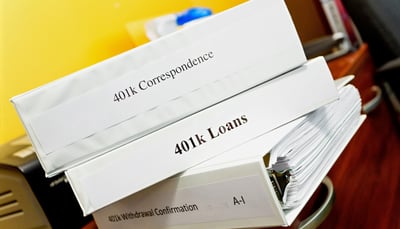Three Reasons To Have a 401(k) Audit
 A 401(k) plan is a common retirement savings option that is offered by many employers to their employees. It's important that companies know once an active participant threshold of 100 is met, the US Department of Labor (DOL) requires a certified audit of your 401(k) plan by a CPA firm. This is because there are risk factors that could impact your plan. Let's look at three of them, and how a 401(k) audit can protect you from these risks, and from financial liability.
A 401(k) plan is a common retirement savings option that is offered by many employers to their employees. It's important that companies know once an active participant threshold of 100 is met, the US Department of Labor (DOL) requires a certified audit of your 401(k) plan by a CPA firm. This is because there are risk factors that could impact your plan. Let's look at three of them, and how a 401(k) audit can protect you from these risks, and from financial liability.
1. Inaccurate Contributions Received
Employees elect a percentage of their gross income to be deposited into their 401(k) plan during each pay period. Upon this election, the plan administrator is responsible for depositing the appropriate percentage of an employee’s pay into their 401(k) plan. If the elected percentage is not being deposited, the employees risk getting paid an inappropriate amount and the company, depending on the type of program, could be contributing an incorrect amount based on the match program.
It is important that the 401(k) plan administrator is reviewing the election made by employees and validating that the appropriate percentage of an employee's pay is being deposited into the plan. During an audit, contribution amounts within the payroll cycle are matched with the original election documents to ensure the contribution is consistent with the employee's election. This mitigates the risk of inaccurate contributions being received by an employee.
2. Improper Benefits Disbursements
While generally an employee's 401(k) plan will receive a contribution during a payroll cycle, there are circumstances in which a disbursement is made out of the plan.
Reasons why a disbursement could occur out of an employee’s benefit plan include:
- A hardship withdrawal
- Termination of employment
When an employee requests a withdrawal from a 401(k) plan, documentation is required to be submitted to the plan administrator to verify that the withdrawal is appropriate. Without verification, there's a risk that monies could go to the wrong employee, or that a withdrawal could take place that the plan owner did not intend.
When a request for disbursement is received, the plan administrator should review the documentation used to support the withdrawal to verify that a disbursement is appropriate. As part of the disbursement audit, tests are performed in which it is validated against applicable support documents.
For example, if an employee were to elect a hardship withdrawal, the audit firm would obtain the hardship paperwork to test the appropriateness of the withdrawal. This provides assurance that disbursements from employee accounts are for appropriate reasons and being sent to the correct individual requesting the disbursement.
3. Inappropriate Participation in the Plan
It is important for administrators to monitor the participants in their plan. Having individuals that are inappropriately included could result in an inaccurate payroll amount for an employee, or potentially a fictitious employee. An audit of the employees in the plan provides assurance over the appropriateness of the individuals in the plan.
During a 401(k) audit, active employees in the payroll reports are selected and a review of source documents (W-4, 401(k) enrollment form, etc.) is performed to validate that the participation by the employee is appropriate.
A 401(k) Audit Can Protect Your Company
Failure to mitigate any of these risks could result in an inappropriate allocation of resources or a loss of money to the plan. Additionally, the DOL outlines general fiduciary responsibilities that a 401(k) Plan Sponsor is required to meet. An accounting firm can perform a 401(k) audit to evaluate and test the processes put in place by the plan administrator. This will provide you with assurance of plan functions and accuracy and confirm that fiduciary responsibilities are being met.
Experienced 401(k) auditors are most likely to be members of the AICPA Employee Benefit Plan Audit Quality Center, and if any process weaknesses are found, they can make recommendations for process improvements.
There are many risks involved in administering a 401(k) plan. Consider conducting a 401(k) audit to identify any risks to your company that have not already been addressed.
Please contact the MRPR team if you have questions about your 401(k) plan. MRPR is a member of the AICPA Employee Benefit Plan Audit Quality Center.
Topics: Business Planning & Operations, Accounting Hot Topics



